Struggling to grow your website traffic despite all your hard work can be incredibly frustrating. The key to unlocking more visitors is solid keyword research, but figuring out which tool to use is a challenge in itself.
Choosing the wrong tool often leads to wasted hours targeting keywords you can never rank for. This is a common hurdle that keeps many site owners from achieving the growth they deserve.
At WPBeginner, we’ve spent over a decade not just testing these tools, but actively using them every day to grow our own site. This hands-on experience means we know exactly what works and what doesn’t.
We’ve put together this comparison to help you find the perfect tool for your needs. Let’s get you equipped to drive more organic traffic and watch your rankings climb.

If you are in a hurry, this handy table will show you our top picks:
| # | Keyword Research Tool | Best For |
|---|---|---|
| 1 | Semrush | The #1 keyword tool on the market |
| 2 | LowFruits | Finds low-competition keywords you can rank for |
| 3 | WPBeginner Keyword Generator | Free keyword research tool |
| 4 | AnswerThePublic | Free keyword research tool |
While those are our quick recommendations, the best tool often comes down to your specific needs and budget. Below, we provide a detailed breakdown of each tool to help you find the perfect match for your website.
- 1. Semrush
- 2. LowFruits
- 3. WPBeginner Keyword Generator
- 4. AnswerThePublic
- 5. Ubersuggest
- 6. Ahrefs
- 7. Google Keyword Planner
- 8. TopicRanker
- Bonus: Serpstat
- Bonus: SpyFu
- Which Is the Best Keyword Research Tool? (Expert Pick)
- Additional Resources & Next Steps
What Is a Keyword Research Tool?
A keyword research tool helps you find topic ideas that people are searching for on platforms like Google, Bing, and Amazon.
This allows you to find content ideas that your customers are actively seeking. You can then build your content strategy around these topics for your blog posts and landing pages.
These tools also show you where your competitors are ranking. You can then improve your content to target those same keywords and attract that traffic to your site.
Editor’s Note: We recommend using the All in One SEO plugin for WordPress along with one of the keyword research tools below for maximum ranking improvements.
How We Use AIOSEO: At WPBeginner, we rely on All in One SEO for all our foundational SEO. It automatically handles our sitemaps, meta tags, and schema markup. This is why we recommend using it alongside a powerful keyword tool. You can read the full story on why we switched from Yoast to AIOSEO.
How We Test and Review Keyword Research Tools
Through extensive testing of keyword research tools, we’ve pinpointed the features users need to find valuable keywords and improve their online visibility.
This practical experience allows us to thoroughly evaluate each tool and provide reliable recommendations. Here’s our testing process:
- Keyword Suggestion Quality: We assess the relevance and variety of keyword suggestions. We look for the ability to generate useful long-tail keywords, identify trending topics, and offer a wide range of ideas.
- Ease of Use for All Skill Levels: We examine how user-friendly the tool is. Beginners should be able to grasp the basics quickly, while experienced users should find advanced features efficient to use.
- Analytical Depth and Features: We look at the depth of analysis and range of features offered. This includes competitor analysis, SERP analysis, and tools for keyword grouping and content planning.
- Value and Cost: We check if the tool is worth the money. For paid tools, we ask if the price is justified. For free tools, we confirm if they are truly useful. We look at what you get for the cost to see if it’s a good deal.
Why Trust WPBeginner?
Since 2009, WPBeginner has been dedicated to SEO best practices and helping website owners succeed online. Our team actively uses keyword research tools daily to grow our online presence and guide our readers.
Based on our hands-on testing, we recommend Semrush and LowFruits as top choices. We regularly test and reassess other solutions to ensure our recommendations remain accurate, unbiased, and helpful. To learn more, see our complete editorial process.
Now, let’s look at the best keyword research tools for SEO that you can use.
1. Semrush

Semrush is a complete SEO tool suite to help you perform keyword research and improve your rankings.
The Keyword Overview tool gives you a complete picture for any keyword you enter. This includes search volume, trends, and much more.
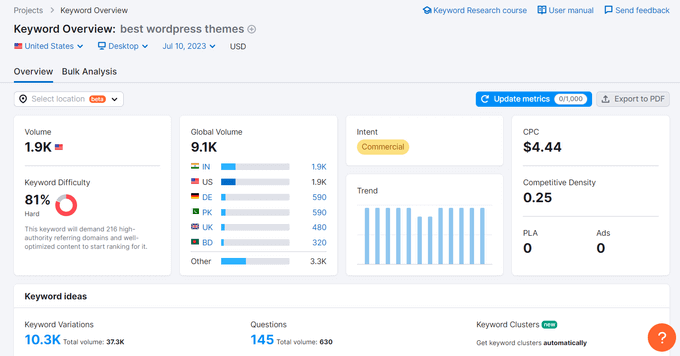
As you scroll down, you can see a list of similar keywords, organic search results, and even Google Ads that target that term.
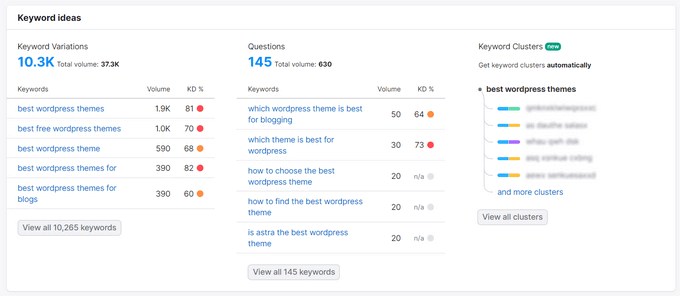
You can also enter a competitor’s website in the Domain Overview to see their organic keywords, traffic metrics, and other important data.
The Organic Research tab shows you relevant keywords, search engine ranking positions (SERPs), traffic value, and more for any competitor.
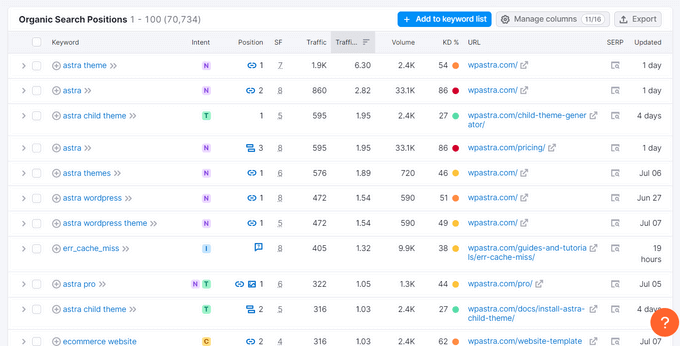
Semrush also integrates with the All in One SEO plugin to help you find additional related keywords right from WordPress.
How We Use Semrush: The Semrush integration with All in One SEO is a key part of our workflow. It allows our writing team to find and add relevant keywords directly inside the WordPress editor, making our content optimization process much more efficient.
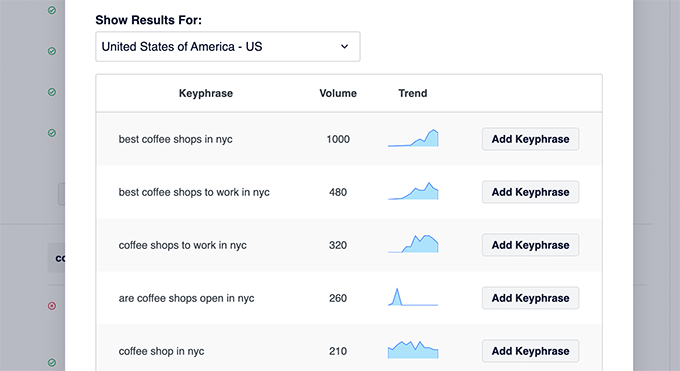
The integration shows you search volumes and trends right in the editor. You can then add the keywords to your content with a single click.
Leading marketers worldwide rate Semrush as the #1 keyword research tool. Its full suite of tools also helps with content marketing, social media, and more.
What We Like About Semrush:
- It’s a complete toolkit with features for competitor analysis, site audits, and rank tracking.
- Provides extensive keyword data, including search volume, difficulty, and related ideas.
- Excellent for researching competitor keywords, strategies, and backlinks.
- Includes features for content planning and SEO writing assistance.
What We Don’t Like About Semrush:
- One of the more expensive keyword research tools on the market.
- Keyword data is still an estimate and not always perfectly accurate.
Why We Recommend Semrush: We recommend Semrush for serious website owners and marketing professionals who need an all-in-one SEO and competitive intelligence platform.
2. LowFruits
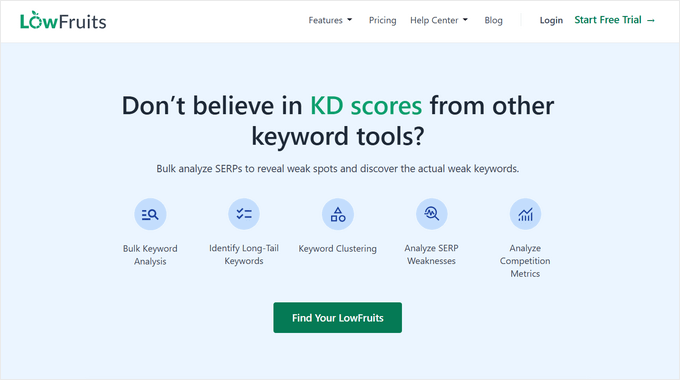
LowFruits is a keyword research tool that helps you find low-competition, high-potential keywords that you can actually rank for.
Its Keyword Finder analyzes Google’s autocomplete data to generate targeted long-tail keyword suggestions. Simply enter a keyword to uncover untapped ranking opportunities.
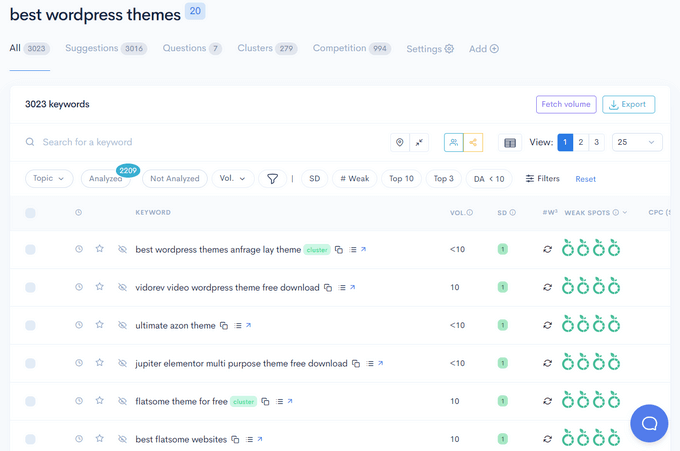
Beyond standard metrics like search volume, LowFruits also identifies weak spots in the SERPs.
The SERP Analyzer feature examines the top 10 Google results and highlights low-authority websites. This makes it easier for you to spot opportunities to outrank competitors.
LowFruits also helps you build niche authority with its Keyword Clustering feature. This process groups similar keywords, allowing you to target related terms on a single page to boost its visibility.
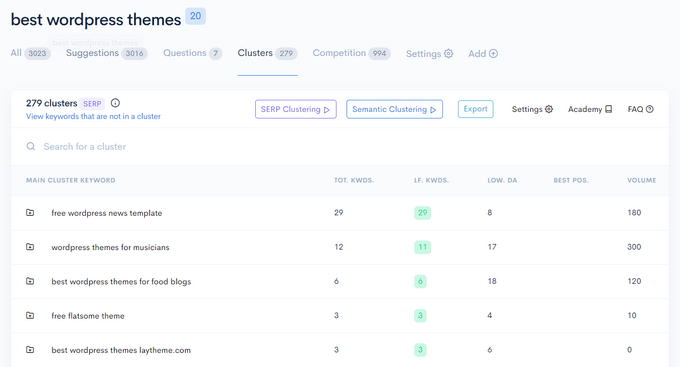
You can view clusters by search intent or semantic structure. Additionally, LowFruits offers other helpful tools, including a Rank Tracker and Domain Explorer.
What We Like About LowFruits:
- Designed to find long-tail keywords with low SEO difficulty, making it easier to rank.
- Analyzes search results to identify weak spots and ranking opportunities.
- Offers an affordable pricing structure, especially for smaller websites and bloggers.
- Features a simple and intuitive interface that is accessible for beginners.
What We Don’t Like About LowFruits:
- Doesn’t offer the same depth of keyword data as comprehensive tools like Semrush.
- Primarily geared towards long-tail keyword research, it is less suitable for broad, high-volume keyword strategies.
Why We Recommend LowFruits: We recommend LowFruits for bloggers, small business owners, and niche website creators who are focused on finding easy-to-rank, long-tail keywords.
3. WPBeginner Keyword Generator
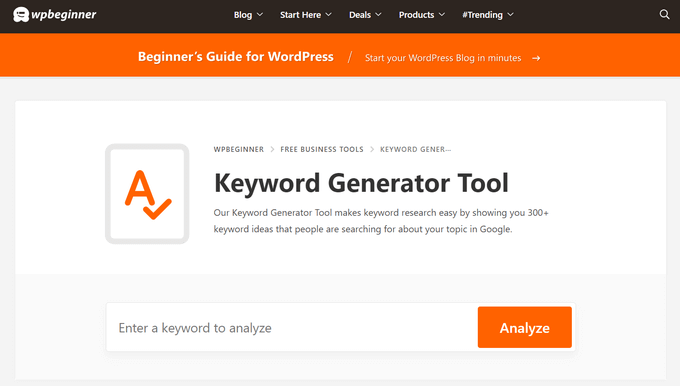
The WPBeginner Keyword Generator is a completely free tool that helps you discover new keyword ideas for your WordPress blog or website.
Simply enter a topic and click ‘Analyze.’ The tool will instantly generate over 300 keyword ideas from Google that you can browse or download as a CSV file.
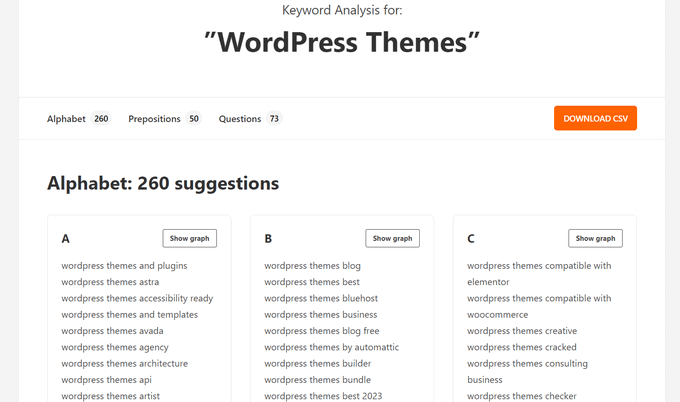
The ideas are neatly organized into three sections: Alphabetical, Prepositions, and Questions. You can also click the ‘Show graph’ button to see the ideas visualized as an SEO topical graph.
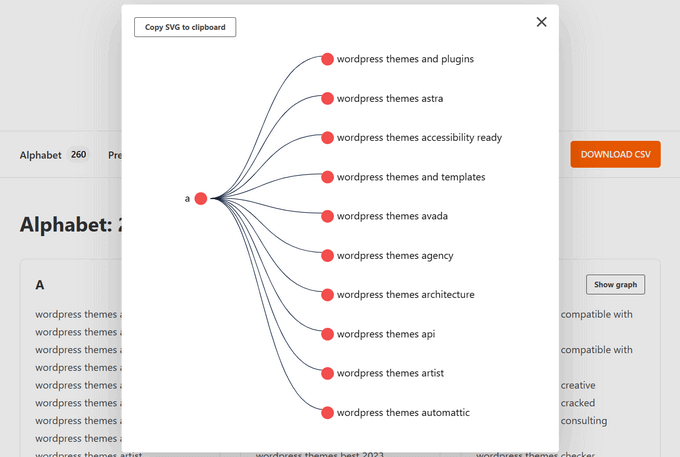
The best part about the WPBeginner tools is that you don’t have to create an account to use them, and there are no daily limits.
What We Like About WPBeginner Keyword Generator:
- Completely free, making it accessible to everyone.
- Very simple and easy to use, perfect for WordPress beginners.
- Generates hundreds of keyword ideas from a single seed keyword.
- Useful for quickly generating initial keyword ideas and variations.
What We Don’t Like About WPBeginner Keyword Generator:
- Provides basic keyword suggestions but lacks in-depth data like search volume or difficulty.
- More suitable for initial brainstorming than deep, strategic keyword research.
Why We Recommend WPBeginner Keyword Generator: We recommend this tool as a free and easy starting point for keyword research. It’s great for quickly brainstorming ideas, especially for WordPress beginners.
4. AnswerThePublic

AnswerThePublic works a bit differently from other tools. It presents keywords in an engaging visual format, though you can also view them in a standard list.
If you’re just getting started with SEO, this is a great tool to try. You don’t even need an account. Just type in your keyword and explore the results.

The results are based on Google and Bing’s auto-suggest features. You can click any keyword to search for it on Google, which will show you what content currently ranks.
The free version is a great resource for bloggers. However, if you perform searches regularly, you will need their pro plan for unlimited access.
What We Like About AnswerThePublic:
- Focuses on questions people ask, uncovering valuable long-tail and question-based keywords.
- Presents keyword ideas in visually appealing formats, making it easy to explore topics.
- Offers a free version with limited daily searches, perfect for trying it out.
- Excellent for generating content ideas that address user questions and pain points.
What We Don’t Like About AnswerThePublic:
- The free version doesn’t provide search volume data for keywords.
- It’s mainly focused on question-based keywords and should be supplemented with other tools for broader research.
Why We Recommend AnswerThePublic: We recommend this tool for content creators who want to understand their audience’s questions. It’s useful for finding long-tail keywords and crafting content that directly answers user queries.
5. Ubersuggest
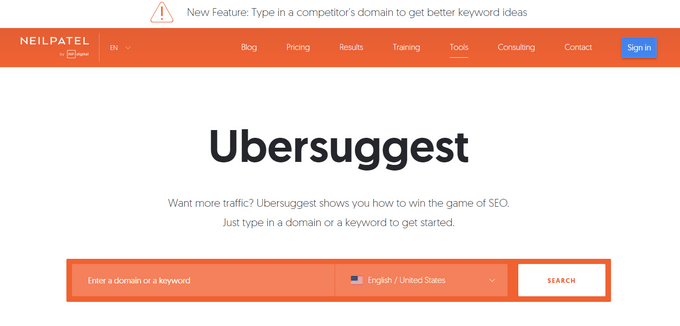
Ubersuggest is a tool from Neil Patel that offers search volume data, keyword suggestions, and keyword difficulty scores.
You can view many related keyword suggestions with data like trend, volume, cost per click (CPC), and SEO difficulty.
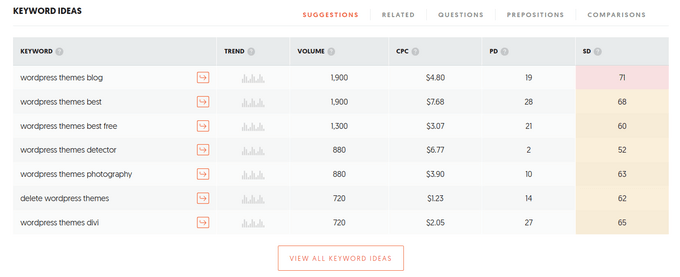
Under Content Ideas, it also shows content related to your keyword, with estimated visits, backlinks, and social shares.

If you sign in with a Google account, you can get more keyword suggestions and daily rank tracking. Ubersuggest also offers a Chrome extension to improve your workflow.
What We Like About Ubersuggest:
- Simple and easy to navigate, making it accessible for beginners.
- Offers affordable pricing plans compared to premium tools like Semrush and Ahrefs.
- Provides keyword overview data, content ideas, and competitor analysis features.
What We Don’t Like About Ubersuggest:
- Some users have questioned the accuracy of its keyword data compared to more established tools.
- The free plan is very limited in terms of daily searches and data access.
Why We Recommend Ubersuggest: We recommend Ubersuggest as a good all-around keyword research tool, especially for users who are looking for an affordable and user-friendly option.
6. Ahrefs

Ahrefs is another popular tool that offers similar features to Semrush. Its keyword explorer provides keyword ideas when you type a term into the search box.
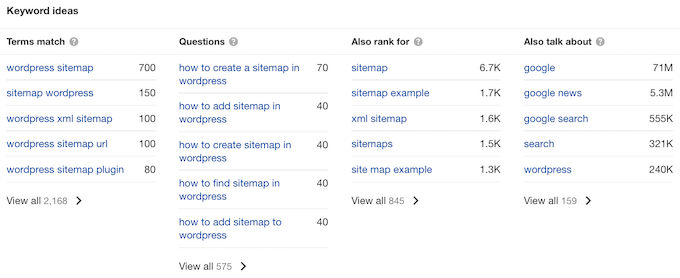
You can also use Ahrefs to see the keywords your competitors rank for but you don’t. This helps you create new content targeting those topics.
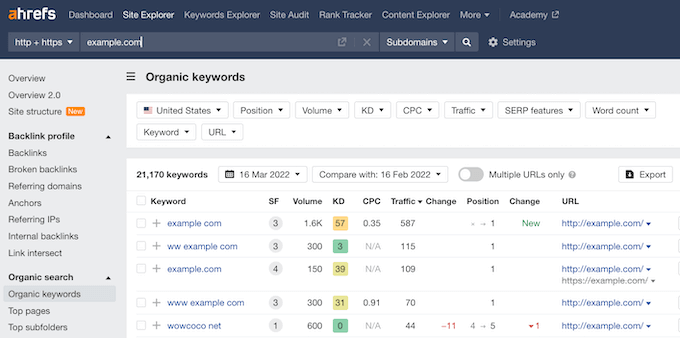
Ahrefs and Semrush both offer many other useful tools. These include reports to find broken links on your site, PPC keyword analysis, and much more.
What We Like About Ahrefs:
- Offers exceptional backlink analysis capabilities, which is its primary strength.
- Provides a wide suite of SEO tools, including keyword research, site audit, and rank tracking.
- Has a very large and frequently updated index of web pages and backlinks.
- Considered to have a highly reliable keyword difficulty score.
What We Don’t Like About Ahrefs:
- One of the most expensive SEO and keyword research tools.
- The sheer amount of data can be overwhelming for beginners.
Why We Recommend Ahrefs: We recommend Ahrefs for SEO professionals, agencies, and large businesses that require comprehensive SEO data and best-in-class backlink analysis.
7. Google Keyword Planner

Google’s Keyword Planner is designed for advertisers, but it’s also a useful and free tool for SEO. To access it, you will need a Google Ads account.
If you don’t have an account, you will need to create one and enter payment details. However, you don’t have to run an active campaign or pay for anything to use the planner.
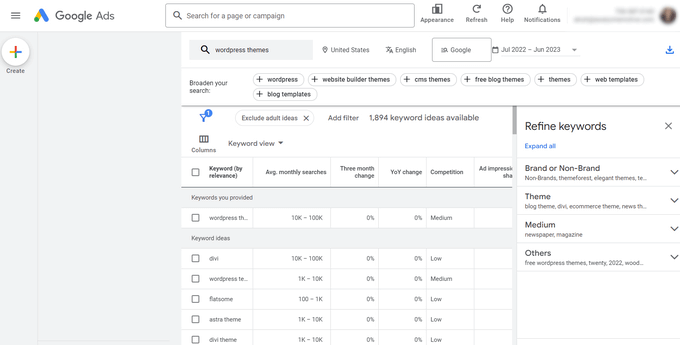
Once inside, you can type in any keyword to view its approximate monthly search volume. You’ll also see a long list of related keyword ideas that you can scroll through or download.
What We Like About Google Keyword Planner:
- Provides keyword data directly from Google.
- Free to use for anyone with a Google Ads account.
- Offers search volume ranges, competition levels, and keyword suggestions.
What We Don’t Like About Google Keyword Planner:
- Data is primarily geared towards paid advertising, so organic SEO metrics are less detailed.
- Keyword suggestions can sometimes be very broad and less specific for long-tail research.
- Lacks the deep competitor analysis features found in dedicated SEO tools.
Why We Recommend Google Keyword Planner: We recommend this as an essential free tool, especially for beginners and anyone running Google Ads campaigns. It’s the official source for Google’s own keyword data.
8. TopicRanker
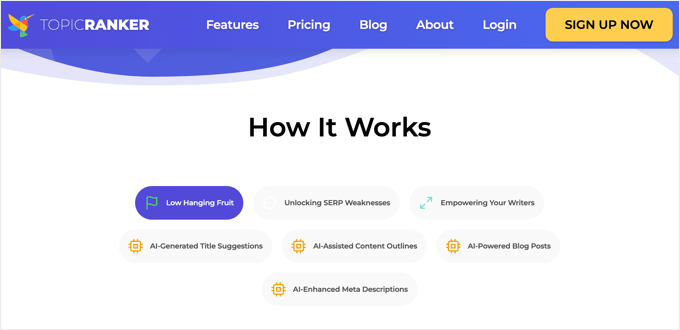
While many tools focus on individual keywords, TopicRanker takes a different approach.
It analyzes the top-ranking content for your target keyword. It then identifies the subtopics, questions, and related terms that help that content succeed, revealing the strategy behind it.
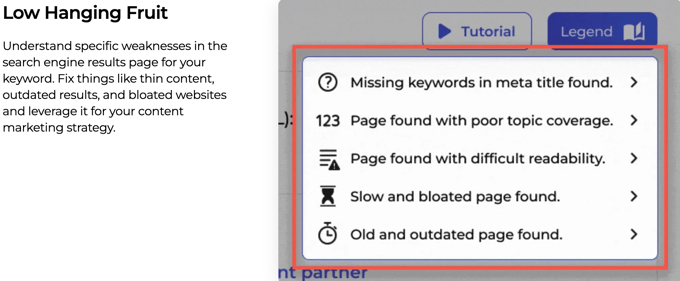
TopicRanker doesn’t just show you keywords to use. It gives you insights into how to structure your content, what subtopics to cover, and which related terms to include to build topical authority.
This makes it a great tool to complement your main keyword research. You can use it to refine your content strategy and gain a competitive edge.
What We Like About TopicRanker:
- Uses AI to identify and cluster related keywords and topics for your content strategy.
- Can generate content briefs based on keyword clusters, aiding in content planning.
- Analyzes top-ranking content to provide insights into effective content structure.
What We Don’t Like About TopicRanker:
- As a newer tool, it may have less historical data than more established platforms.
- Primarily focused on content strategy and topic clustering, it needs to be supplemented for broad keyword research.
Why We Recommend TopicRanker: We recommend TopicRanker for content marketers and strategists looking for an AI-powered tool to help with content planning and building topical authority.
Bonus: Serpstat

Serpstat is another excellent keyword research tool. You can use it to find new keyword ideas with information on search volume, CPC, interest over time, and more.
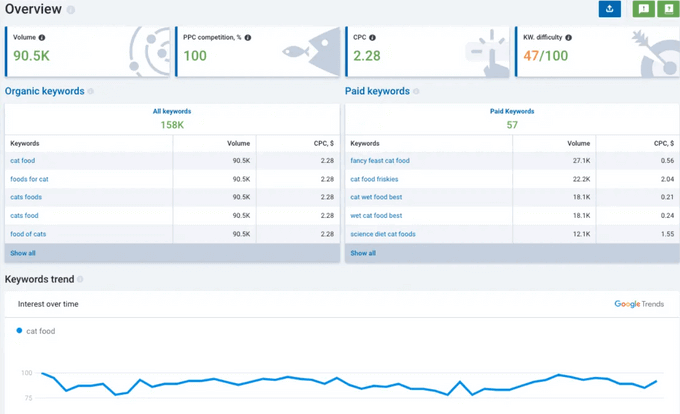
With Serpstat, you can easily view the top Google results for your keyword. These results include the site that appears in the featured snippet, if any.
Why We Recommend Serpstat: We recommend Serpstat as a strong all-in-one SEO platform that offers a good balance of features, data, and affordability. It’s a great alternative to more expensive tools like Semrush and Ahrefs.
Bonus: SpyFu
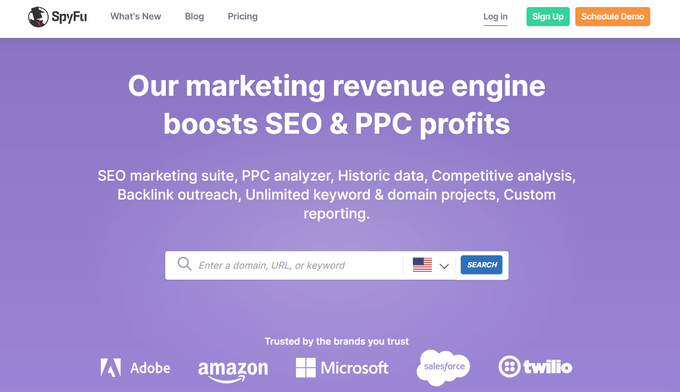
SpyFu is designed to let you learn from your competitors by exploring their most profitable keywords and ads.
You can try it for free without even logging in. Just type a competitor’s URL into the search bar to see the results instantly.
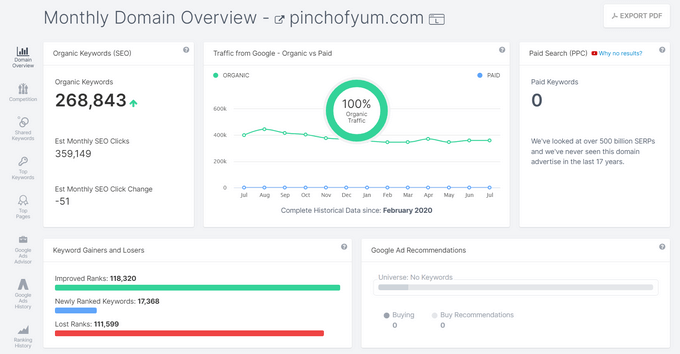
SpyFu collects historical data, so you can see how your site or a competitor’s site has risen or fallen in the rankings for specific keywords. You can also compare your site against others in your industry.
Why We Recommend SpyFu: We recommend SpyFu for users who are intensely focused on competitor keyword research and want to gain a deep understanding of their competitors’ SEO and PPC strategies.
Which Is the Best Keyword Research Tool? (Expert Pick)
After trying out all the popular keyword research tools, we believe that Semrush is the best keyword research tool and the #1 SEO toolkit on the market.
We also highly recommend LowFruits. It’s the perfect tool for finding low-competition keywords that you can rank for.
If you’re looking for a free keyword research tool, then try our WPBeginner Keyword Generator or AnswerThePublic.
For any keyword strategy to be effective, it’s essential to set up Google Analytics and connect Google Search Console to your website.
These tools help you see how your website is performing for specific keywords and show you the average click-through rate (CTR) for your content. You can then tweak your titles to improve CTR and boost your rankings.
Frequently Asked Questions About Keyword Research Tools
Having helped thousands of users choose the right SEO tools, we’ve answered our fair share of questions. Here are the answers to some of the most common ones.
Which is the best keyword research tool for beginners?
For beginners, we highly recommend starting with free tools like our WPBeginner Keyword Generator or AnswerThePublic. They are very easy to use and help you find great topic ideas without feeling overwhelmed.
LowFruits is also an excellent paid option designed specifically to find low-competition keywords, which is perfect when you’re starting out.
Can I do keyword research for free?
Absolutely. Tools like Google Keyword Planner, our own keyword generator, and the free version of AnswerThePublic provide plenty of ideas to get you started.
While they lack the deep competitive data of paid tools, they are powerful enough for building a solid content strategy.
Why should I pay for a keyword research tool?
Paid tools like Semrush and Ahrefs offer a significant advantage with more detailed data. They provide competitive insights, keyword difficulty scores, and rank tracking.
These features are essential for growing your site in a competitive space and making smarter marketing decisions.
What is a good keyword difficulty score?
A good keyword difficulty score is relative to your website’s authority. For new websites, it’s best to target keywords with a very low difficulty score, often under 20 on most tools.
As your site builds more authority with quality content and backlinks, you can begin to target more competitive keywords with higher scores.
Additional Resources & Next Steps
Now that you’ve seen the best keyword research tools available, you can use these guides to put your findings into action and improve your rankings.
- How to Do Keyword Research for Your WordPress Blog – Follow our step-by-step process for finding and analyzing the right keywords for your content strategy.
- How to Optimize Your Blog Posts for SEO – Learn our proven method for optimizing posts to rank higher in search results.
- Ultimate WordPress SEO Guide for Beginners – Our complete guide covers all the essential aspects of WordPress SEO to help you get more traffic.
If you liked this article, then please subscribe to our YouTube Channel for WordPress video tutorials. You can also find us on Twitter and Facebook.





Jiří Vaněk
Keyword research is important to me, but I first had to learn a lot about it from courses and articles like the ones here. I used Semrush, but I’m limited by the free account. Now that I’ve seen AIO SEO integrate Low Fruits, it gives me hope that this process will be easier for AIO SEO users, and I’ll be able to use integrated tools directly in my WordPress. Thanks, in any case, for showing other tools besides Semrush that can be used as alternatives.
Moinuddin Waheed
keyword research makes an important component of blogging journey specially to have organic traffic.
I have used many tools. Semrush is infact best among them but is paid and it becomes very difficult for any blogger just starting out to afford that tool.
Most of the people have reservations about the free tools.
are they accurate enough to rely on?
do they provide other options as well to scale?
WPBeginner Support
The free tools can still work for sites and some of the sites that offer a free version have a paid version that offers more insight.
Admin
Ahmed Omar
Although I am writing my content for long time
It is my first time to know about Google Keyword Planner, also I did not know about WPBeginner Keyword Generator
the post is very valuable and helpful
Thank you
WPBeginner Support
You’re welcome
Admin
Maria
Thank you for this article. I am a newbie trying to create my own website, and this was very helpful. I know more about SEO tools and the tools offered. Now that I am more knowledgeable, thanks to you, and can start my keyword searches for better content.
Thank you again.
WPBeginner Support
Glad you found our list helpful
Admin
Jennifer Duffy
Thank you so much for providing all of this excellent information in a very easy-to-understand format!
WPBeginner Support
You’re welcome
Admin